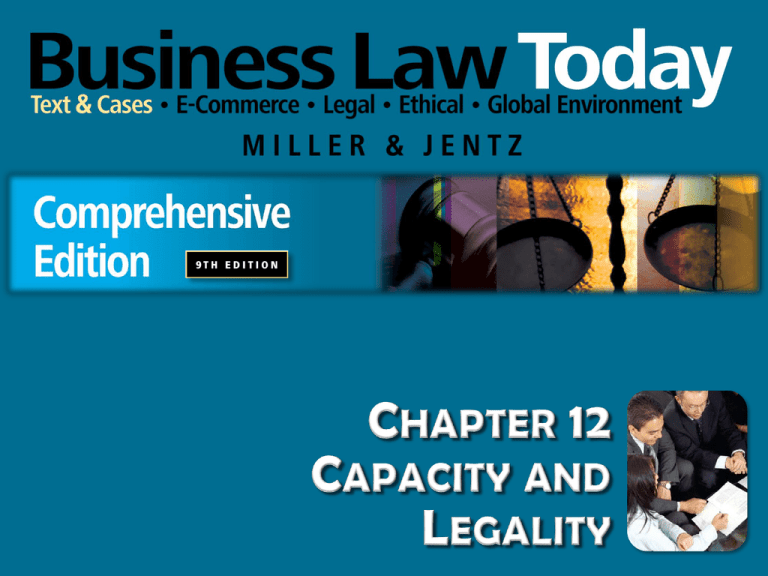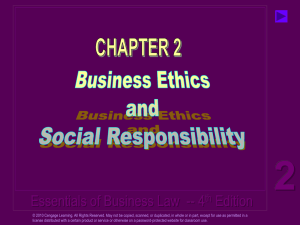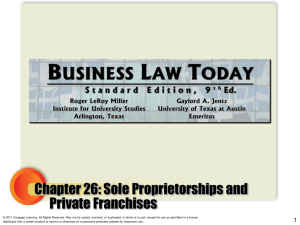
• Does a minor have the capacity to
enter into an enforceable contract?
What does it mean to disaffirm a
contract?
• Does an intoxicated person have the
capacity to enter into an enforceable
contract?
© 2012 Cengage Learning. All Rights Reserved. May not be copied, scanned, or duplicated, in whole or in part, except for use as
permitted in a license distributed with a certain product or service or otherwise on a password-protected website for classroom use.
2
• Does the mental incompetence of
one party necessarily make a
contract void?
• Under what circumstances will a
covenant not to compete be
enforceable? When will such
covenants not be enforced?
© 2012 Cengage Learning. All Rights Reserved. May not be copied, scanned, or duplicated, in whole or in part, except for use as
permitted in a license distributed with a certain product or service or otherwise on a password-protected website for classroom use.
3
• What is an exculpatory clause? In
what circumstances might
exculpatory clauses be enforced?
When will they not be enforced?
© 2012 Cengage Learning. All Rights Reserved. May not be copied, scanned, or duplicated, in whole or in part, except for use as
permitted in a license distributed with a certain product or service or otherwise on a password-protected website for classroom use.
4
• Contractual Capacity: legal ability to
enter into a contractual relationship.
Examples:
–Person determined by court to be
mentally incompetent cannot form a
valid contract.
–In other situations, capacity may exist,
but contract is not legally binding.
© 2012 Cengage Learning. All Rights Reserved. May not be copied, scanned, or duplicated, in whole or in part, except for use as
permitted in a license distributed with a certain product or service or otherwise on a password-protected website for classroom use.
5
• Minors.
–Generally, at 18 years, a person is
emancipated, and has the legal
capacity to enter into any contract that
an adult can.
–However, a contract entered into by a
minor is voidable at the option of that
minor, and can be disaffirmed.
© 2012 Cengage Learning. All Rights Reserved. May not be copied, scanned, or duplicated, in whole or in part, except for use as
permitted in a license distributed with a certain product or service or otherwise on a password-protected website for classroom use.
6
• Minors (cont’d).
–Disaffirmance.
• A contract can be disaffirmed at any time
during minority, or for a reasonable
period after minor is emancipated.
• Minor must disaffirm the entire contract.
Disaffirmance can be expressed or
implied.
© 2012 Cengage Learning. All Rights Reserved. May not be copied, scanned, or duplicated, in whole or in part, except for use as
permitted in a license distributed with a certain product or service or otherwise on a password-protected website for classroom use.
7
• Minors (cont’d).
–Minor’s Obligations on Disaffirmance.
• Majority Rule: minor need only return
the goods (or other consideration)
subject to the contract, provided the
goods are in the minor’s possession or
control.
• Minority Rule.
© 2012 Cengage Learning. All Rights Reserved. May not be copied, scanned, or duplicated, in whole or in part, except for use as
permitted in a license distributed with a certain product or service or otherwise on a password-protected website for classroom use.
8
• Minors (cont’d).
–Minor’s Obligations on Disaffirmance.
• Minority rule: increasing number of
states hold the minor must restore the
adult to the position held before the
contract was made.
© 2012 Cengage Learning. All Rights Reserved. May not be copied, scanned, or duplicated, in whole or in part, except for use as
permitted in a license distributed with a certain product or service or otherwise on a password-protected website for classroom use.
9
• Minors (cont’d).
–Exceptions to Minor’s Right to
Disaffirm.
• Misrepresentation of Age.
• Minor Who Conducts Business Like an
Adult.
• Contracts for Necessaries.
© 2012 Cengage Learning. All Rights Reserved. May not be copied, scanned, or duplicated, in whole or in part, except for use as
permitted in a license distributed with a certain product or service or otherwise on a password-protected website for classroom use.
10
• Minors (cont’d).
–Ratification: occurs when a minor, on or
after reaching majority, indicates (expressly
or impliedly) an intention to become bound
by a contract made as a minor.
–Parents’ Liability: Parents generally not
liable, unless they co-sign with minor.
© 2012 Cengage Learning. All Rights Reserved. May not be copied, scanned, or duplicated, in whole or in part, except for use as
permitted in a license distributed with a certain product or service or otherwise on a password-protected website for classroom use.
11
• Intoxicated Persons.
–Lack of capacity at the time the
contract is being made. Contract is
either voidable or valid, depending on
circumstances.
–Disaffirmance (voidable).
–Ratification: after ‘sobering up.’
© 2012 Cengage Learning. All Rights Reserved. May not be copied, scanned, or duplicated, in whole or in part, except for use as
permitted in a license distributed with a certain product or service or otherwise on a password-protected website for classroom use.
12
• Mentally Incompetent Persons.
–Void: If a person has been adjudged
mentally incompetent by a court of law and
a guardian has been appointed.
–Voidable: If the person does not know he
or she is entering into the contract or lacks
the mental capacity to comprehend its
nature, purpose, and consequences.
© 2012 Cengage Learning. All Rights Reserved. May not be copied, scanned, or duplicated, in whole or in part, except for use as
permitted in a license distributed with a certain product or service or otherwise on a password-protected website for classroom use.
13
• Mentally Incompetent Persons
(cont’d).
–Valid: when person is able to
understand the nature and effect of
entering into a contract but may lack
capacity to engage in other activities
(known as “lucid” intervals).
© 2012 Cengage Learning. All Rights Reserved. May not be copied, scanned, or duplicated, in whole or in part, except for use as
permitted in a license distributed with a certain product or service or otherwise on a password-protected website for classroom use.
14
• For a contract to be enforceable, it
must be formed for a legal purpose.
• A specific clause in contract can be
illegal, but rest of contract can be
enforceable.
• Contract to commit a tortious act is
illegal.
© 2012 Cengage Learning. All Rights Reserved. May not be copied, scanned, or duplicated, in whole or in part, except for use as
permitted in a license distributed with a certain product or service or otherwise on a password-protected website for classroom use.
15
• Contracts Contrary to Statute.
–Contracts to do something prohibited
by federal or state statutory law is
illegal and therefore void (never
existed).
–Contracts to Commit a Crime.
–Contracts for Usury.
© 2012 Cengage Learning. All Rights Reserved. May not be copied, scanned, or duplicated, in whole or in part, except for use as
permitted in a license distributed with a certain product or service or otherwise on a password-protected website for classroom use.
16
• Contracts Contrary to Statute
(cont’d).
–Gambling: distribution of property based
on chance among persons who have paid
valuable consideration.
• Online Gambling: Unlawful Internet Gambling
Enforcement Act (2006) bars electronic
payments, and allows civil forfeiture.
–Licensing Statutes.
© 2012 Cengage Learning. All Rights Reserved. May not be copied, scanned, or duplicated, in whole or in part, except for use as
permitted in a license distributed with a certain product or service or otherwise on a password-protected website for classroom use.
17
• Contracts Contrary to Public Policy.
–Contracts in Restraint of Trade are
generally void, unless reasonable and
ancillary to the contract.
• Public policy goal is to promote
competition.
© 2012 Cengage Learning. All Rights Reserved. May not be copied, scanned, or duplicated, in whole or in part, except for use as
permitted in a license distributed with a certain product or service or otherwise on a password-protected website for classroom use.
18
• Contracts Contrary to Public Policy
(cont’d).
–Restraint of Trade (cont’d).
• Covenant Not to Compete in Employment
Contract is enforceable as long as time
and geographic terms are reasonable.
• CASE 12.1 Comedy Club, Inc. v. Improv
West Associates (2009). What factors did
the court consider?
© 2012 Cengage Learning. All Rights Reserved. May not be copied, scanned, or duplicated, in whole or in part, except for use as
permitted in a license distributed with a certain product or service or otherwise on a password-protected website for classroom use.
19
• Contracts Contrary to Public Policy
(cont’d).
–Restraint of Trade (cont’d).
• Enforcement Problems. Court sometimes
resort to contract reformation.
© 2012 Cengage Learning. All Rights Reserved. May not be copied, scanned, or duplicated, in whole or in part, except for use as
permitted in a license distributed with a certain product or service or otherwise on a password-protected website for classroom use.
20
• Contracts Contrary to Public Policy
(cont’d).
–Unconscionable Contracts or Clauses.
• Procedural Unconscionability:
inconspicuous print or legalese.
–Depends on a party’s lack of knowledge or
expertise.
© 2012 Cengage Learning. All Rights Reserved. May not be copied, scanned, or duplicated, in whole or in part, except for use as
permitted in a license distributed with a certain product or service or otherwise on a password-protected website for classroom use.
21
• Contracts Contrary to Public Policy
(cont’d).
–Unconscionable Contracts or Clauses.
• Substantive Unconscionability: contracts
are oppressive or overly harsh.
–CASE 12.2 Lhotka v. Geographic Expeditions,
Inc. (2010). What made the arbitration
clause unenforceable?
© 2012 Cengage Learning. All Rights Reserved. May not be copied, scanned, or duplicated, in whole or in part, except for use as
permitted in a license distributed with a certain product or service or otherwise on a password-protected website for classroom use.
22
• Contracts Contrary to Public Policy
(cont’d).
–Exculpatory Clauses: release a party from
liability in the event of monetary or
physical injury – no matter who is at
fault.
• Enforceable when they are not against
public policy, are not ambiguous, and do not
shield parties from intentional conduct.
© 2012 Cengage Learning. All Rights Reserved. May not be copied, scanned, or duplicated, in whole or in part, except for use as
permitted in a license distributed with a certain product or service or otherwise on a password-protected website for classroom use.
23
© 2012 Cengage Learning. All Rights Reserved. May not be copied, scanned, or duplicated, in whole or in part, except for use as
permitted in a license distributed with a certain product or service or otherwise on a password-protected website for classroom use.
24
• Generally, illegal contracts are void.
–If contract is executory, cannot be
enforced.
–Unjust enrichment is not an issue.
• Exceptions:
–Justifiable Ignorance of the Facts.
–Members of Protected Classes.
© 2012 Cengage Learning. All Rights Reserved. May not be copied, scanned, or duplicated, in whole or in part, except for use as
permitted in a license distributed with a certain product or service or otherwise on a password-protected website for classroom use.
25
• Exceptions (cont’d):
–Withdrawal from an Illegal Agreement.
–Severable or Divisible Contracts.
–Contract Illegal through Fraud, Duress,
or Undue Influence.
© 2012 Cengage Learning. All Rights Reserved. May not be copied, scanned, or duplicated, in whole or in part, except for use as
permitted in a license distributed with a certain product or service or otherwise on a password-protected website for classroom use.
26
© 2012 Cengage Learning. All Rights Reserved. May not be copied, scanned, or duplicated, in whole or in part, except for use as
permitted in a license distributed with a certain product or service or otherwise on a password-protected website for classroom use.
27







